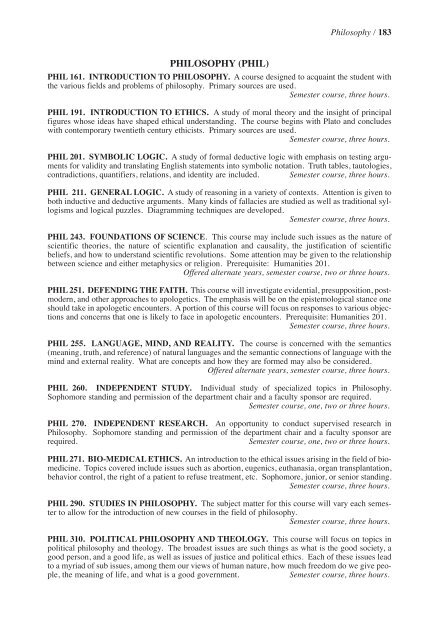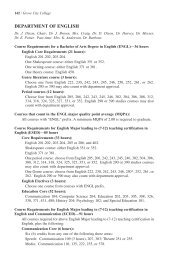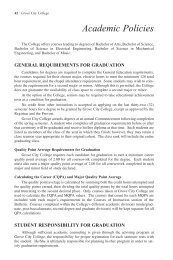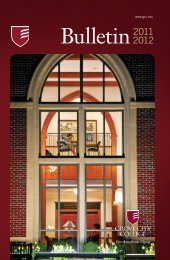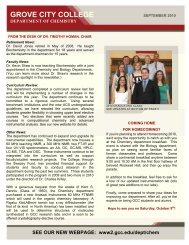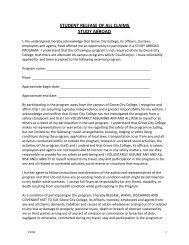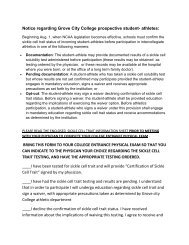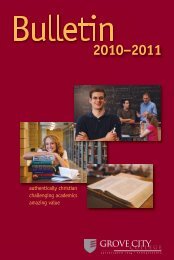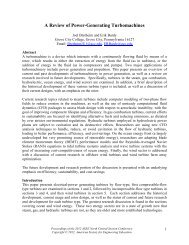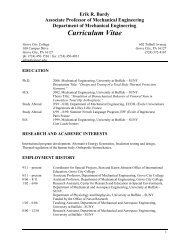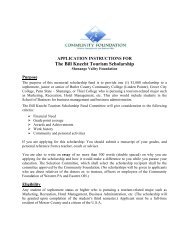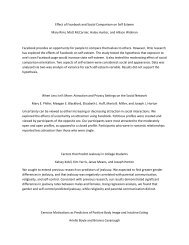2009–2010 - Grove City College
2009–2010 - Grove City College
2009–2010 - Grove City College
You also want an ePaper? Increase the reach of your titles
YUMPU automatically turns print PDFs into web optimized ePapers that Google loves.
PHILOSOPHY (PHIL)<br />
Philosophy / 183<br />
PHIL 161. INTRODUCTION TO PHILOSOPHY. A course designed to acquaint the student with<br />
the various fields and problems of philosophy. Primary sources are used.<br />
Semester course, three hours.<br />
PHIL 191. INTRODUCTION TO ETHICS. A study of moral theory and the insight of principal<br />
figures whose ideas have shaped ethical understanding. The course begins with Plato and concludes<br />
with contemporary twentieth century ethicists. Primary sources are used.<br />
Semester course, three hours.<br />
PHIL 201. SYMBOLIC LOGIC. A study of formal deductive logic with emphasis on testing arguments<br />
for validity and translating English statements into symbolic notation. Truth tables, tautologies,<br />
contradictions, quantifiers, relations, and identity are included. Semester course, three hours.<br />
PHIL 211. GENERAL LOGIC. A study of reasoning in a variety of contexts. Attention is given to<br />
both inductive and deductive arguments. Many kinds of fallacies are studied as well as traditional syllogisms<br />
and logical puzzles. Diagramming techniques are developed.<br />
Semester course, three hours.<br />
PHIL 243. FOUNDATIONS OF SCIENCE. This course may include such issues as the nature of<br />
scientific theories, the nature of scientific explanation and causality, the justification of scientific<br />
beliefs, and how to understand scientific revolutions. Some attention may be given to the relationship<br />
between science and either metaphysics or religion. Prerequisite: Humanities 201.<br />
Offered alternate years, semester course, two or three hours.<br />
PHIL 251. DEFENDING THE FAITH. This course will investigate evidential, presupposition, postmodern,<br />
and other approaches to apologetics. The emphasis will be on the epistemological stance one<br />
should take in apologetic encounters. A portion of this course will focus on responses to various objections<br />
and concerns that one is likely to face in apologetic encounters. Prerequisite: Humanities 201.<br />
Semester course, three hours.<br />
PHIL 255. LANGUAGE, MIND, AND REALITY. The course is concerned with the semantics<br />
(meaning, truth, and reference) of natural languages and the semantic connections of language with the<br />
mind and external reality. What are concepts and how they are formed may also be considered.<br />
Offered alternate years, semester course, three hours.<br />
PHIL 260. INDEPENDENT STUDY. Individual study of specialized topics in Philosophy.<br />
Sophomore standing and permission of the department chair and a faculty sponsor are required.<br />
Semester course, one, two or three hours.<br />
PHIL 270. INDEPENDENT RESEARCH. An opportunity to conduct supervised research in<br />
Philosophy. Sophomore standing and permission of the department chair and a faculty sponsor are<br />
required. Semester course, one, two or three hours.<br />
PHIL 271. BIO-MEDICAL ETHICS. An introduction to the ethical issues arising in the field of biomedicine.<br />
Topics covered include issues such as abortion, eugenics, euthanasia, organ transplantation,<br />
behavior control, the right of a patient to refuse treatment, etc. Sophomore, junior, or senior standing.<br />
Semester course, three hours.<br />
PHIL 290. STUDIES IN PHILOSOPHY. The subject matter for this course will vary each semester<br />
to allow for the introduction of new courses in the field of philosophy.<br />
Semester course, three hours.<br />
PHIL 310. POLITICAL PHILOSOPHY AND THEOLOGY. This course will focus on topics in<br />
political philosophy and theology. The broadest issues are such things as what is the good society, a<br />
good person, and a good life, as well as issues of justice and political ethics. Each of these issues lead<br />
to a myriad of sub issues, among them our views of human nature, how much freedom do we give people,<br />
the meaning of life, and what is a good government. Semester course, three hours.


